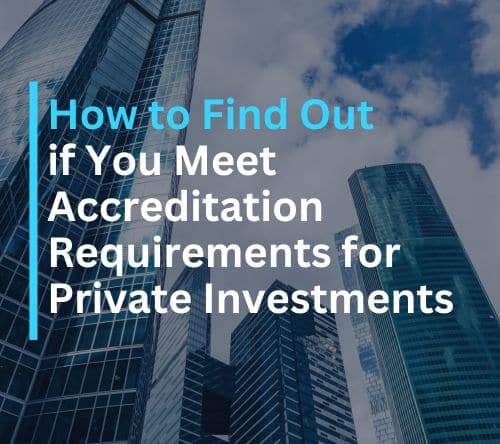What is an Accredited Investor: How to Find Out if You Meet Accreditation Requirements for Private Investments
Investing in private markets can offer unique opportunities that aren’t available to the general public. These investments—such as hedge funds, venture capital, private funds, and real estate syndications—are often limited to a specific group of people known as accredited investors. Currently, Redwood Capital’s investment offerings are only available to accredited investors. If you’ve ever heard the term but aren’t sure if you qualify, this post will guide you through what it means to be an accredited investor and how to determine if you meet the criteria.
What Is an Accredited Investor?
An accredited investor is an individual or entity that meets specific financial criteria established by the U.S. Securities and Exchange Commission (SEC). The purpose of these criteria is to ensure that those participating in high-risk, high-reward investments are financially capable of handling potential losses.
In essence, the SEC wants to make sure that private investments are limited to individuals who have enough financial sophistication and resources to bear the risks involved.
Why Does Accreditation Matter?
Accredited investors have access to a wider range of investment opportunities than non-accredited individuals. These include private equity funds, hedge funds, angel investing, and certain types of real estate deals like syndications and funds. While these investments can provide attractive returns, they also come with higher risks, fewer regulations, and less transparency than publicly traded stocks and bonds. Therefore, the SEC requires that only those who meet certain financial thresholds can participate.
How to Qualify as an Accredited Investor
To qualify as an accredited investor, you must meet at least one of the following criteria:
1. Income-Based Accreditation
You are considered an accredited investor if:
- You have an individual income of over $200,000 in each of the last two years, and you expect to maintain this income in the current year.
- If you are married or filing jointly with a spouse, the income threshold rises to $300,000.
This income must be consistent, and the expectation is that you will continue earning at or above this level.
2. Net Worth-Based Accreditation
You can also qualify if your net worth exceeds $1 million, either individually or jointly with your spouse. This calculation excludes the value of your primary residence. In other words, you cannot count the equity in your home towards your net worth for accreditation purposes.
3. Professional Certification or Designation
In 2020, the SEC expanded the criteria to include individuals holding certain professional certifications, designations, or other credentials. For example, those holding valid Series 7, Series 65, or Series 82 licenses may qualify as accredited investors, regardless of their income or net worth.
4. Entity-Based Accreditation
Accredited investors aren’t limited to individuals. Certain entities can also qualify:
- A business or trust with assets exceeding $5 million that wasn’t formed for the sole purpose of investing in a specific deal.
- Entities where all equity owners are accredited investors.
How to Determine if You Meet Accreditation Requirements
Now that you know the criteria, here’s how you can figure out if you qualify.
1. Review Your Financials
The first step is to evaluate your income and net worth. Look at your tax returns to verify your income for the past two years, and assess whether your earnings will continue at or above the $200,000 (or $300,000 for joint filings) level. Next, calculate your net worth by subtracting any liabilities (like debts or loans) from your assets—making sure to exclude the value of your primary residence.
2. Check Your Professional Credentials
If you’re in the financial services industry, check whether you hold any certifications like Series 7, 65, or 82 licenses that might qualify you as an accredited investor. If you’re unsure, you can reach out to the organization that issued your certification or consult the SEC’s guidelines.
3. Consult with a Financial Advisor or Tax Accountant
If you’re not certain about whether you meet the qualifications or how to calculate your net worth, it’s a good idea to consult with a financial advisor. They can help you assess your financial situation and ensure that you meet the accreditation requirements before pursuing private investments.
Why Should You Care About Accreditation?
Being accredited opens doors to investment opportunities that could potentially offer higher returns. Many successful businesses and real estate projects are funded through private capital, and these kinds of investments often provide returns that outpace more traditional assets. However, they also come with greater risk, and that’s why the SEC enforces accreditation rules—to protect investors from risks they may not be equipped to handle.
What Documentation Is Needed to Prove Accreditation?
If you determine that you qualify as an accredited investor, the next step is to prepare the necessary documentation to verify your status. When investing in private opportunities, issuers typically require proof of accreditation. Here are the documents you should be prepared to supply, depending on how you meet the requirements:
1. Income-Based Accreditation Documentation
For those qualifying based on income, you will need to provide:
- Tax returns for the past two years showing your income level (Form 1040).
- W-2s or 1099s from your employer or any other income sources.
- A signed statement verifying that you expect to meet the required income threshold for the current year.
2. Net Worth-Based Accreditation Documentation
If you’re qualifying based on your net worth, you’ll need to gather documents that verify your assets and liabilities:
- Bank statements, brokerage account statements, and other financial account records that show your assets.
- Real estate appraisals or other valuation documents for any properties (excluding your primary residence).
- Credit reports or loan statements to verify any outstanding liabilities and debts.
- A signed statement from a third-party professional (such as a CPA, attorney, or financial advisor) who has reviewed your financial situation and can verify that your net worth exceeds $1 million.
3. Professional Certification or Designation
If you’re qualifying through professional certification, you’ll need:
- Proof of your Series 7, 65, or 82 license or other acceptable credential.
- Documentation showing that your license is current and valid.
4. Third-Party Verification
Some issuers may accept third-party verification from professionals like CPAs, attorneys, or financial advisors. In such cases, the third party will need to provide a written confirmation that they’ve reviewed your financials and determined that you meet the accreditation criteria. This verification is usually valid for up to three months.
5. Entity-Based Accreditation Documentation
If you’re investing as an entity (such as a trust or corporation), you will need:
- Organizational documents showing that the entity has more than $5 million in assets or that all equity owners are accredited investors.
- Financial statements for the entity that demonstrate its asset levels.
Accreditation Opens Doors to New Investment Possibilities
Becoming an accredited investor gives you access to exclusive opportunities in private markets, but it’s essential to meet the SEC’s financial requirements. By reviewing your income, net worth, and any relevant professional credentials, you can determine if you qualify. And remember, while these opportunities can be enticing, they also come with their own set of risks, so it’s crucial to fully understand both the potential rewards and the possible downsides before investing.
If you believe you meet the criteria but are uncertain, consider reaching out to a financial advisor to confirm your status and explore potential private investment opportunities that align with your financial goals.




